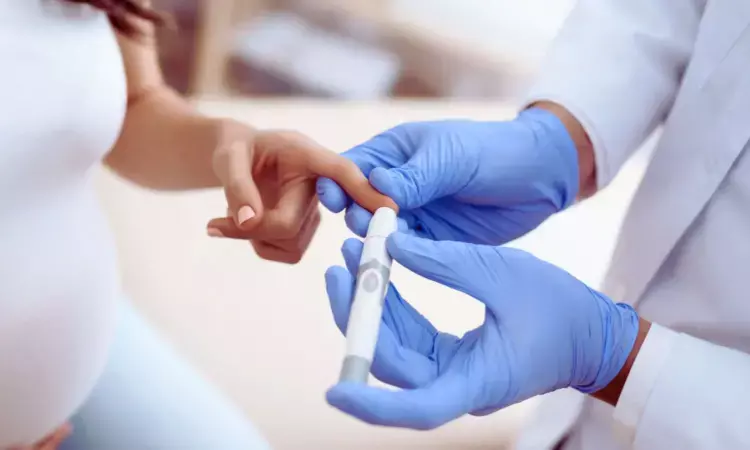- Home
- Medical news & Guidelines
- Anesthesiology
- Cardiology and CTVS
- Critical Care
- Dentistry
- Dermatology
- Diabetes and Endocrinology
- ENT
- Gastroenterology
- Medicine
- Nephrology
- Neurology
- Obstretics-Gynaecology
- Oncology
- Ophthalmology
- Orthopaedics
- Pediatrics-Neonatology
- Psychiatry
- Pulmonology
- Radiology
- Surgery
- Urology
- Laboratory Medicine
- Diet
- Nursing
- Paramedical
- Physiotherapy
- Health news
- Fact Check
- Bone Health Fact Check
- Brain Health Fact Check
- Cancer Related Fact Check
- Child Care Fact Check
- Dental and oral health fact check
- Diabetes and metabolic health fact check
- Diet and Nutrition Fact Check
- Eye and ENT Care Fact Check
- Fitness fact check
- Gut health fact check
- Heart health fact check
- Kidney health fact check
- Medical education fact check
- Men's health fact check
- Respiratory fact check
- Skin and hair care fact check
- Vaccine and Immunization fact check
- Women's health fact check
- AYUSH
- State News
- Andaman and Nicobar Islands
- Andhra Pradesh
- Arunachal Pradesh
- Assam
- Bihar
- Chandigarh
- Chattisgarh
- Dadra and Nagar Haveli
- Daman and Diu
- Delhi
- Goa
- Gujarat
- Haryana
- Himachal Pradesh
- Jammu & Kashmir
- Jharkhand
- Karnataka
- Kerala
- Ladakh
- Lakshadweep
- Madhya Pradesh
- Maharashtra
- Manipur
- Meghalaya
- Mizoram
- Nagaland
- Odisha
- Puducherry
- Punjab
- Rajasthan
- Sikkim
- Tamil Nadu
- Telangana
- Tripura
- Uttar Pradesh
- Uttrakhand
- West Bengal
- Medical Education
- Industry
First-Trimester Neutrophil Counts Not Useful for GDM Prediction: Study

A new study published in the journal of Cureus showed that Maternal age, BMI, weight gain, and history of gestational diabetes mellitus (GDM) remain strong predictors of GDM. Further first-trimester neutrophil counts showed no predictive value, limiting their use as early inflammatory markers.
GDM, is associated with severe hazards for both the mother and the newborn, including polyhydramniosis and the fetal risk of large for gestational age (LGA). In this study, women who frequent National Guard primary care clinics in Jeddah, Saudi Arabia, were asked to rate the predictive value of first-trimester complete blood count (CBC) characteristics, namely the neutrophil count, for the onset of GDM.
Included were pregnant women between the ages of 18 and 45 who received GDM screening at weeks 24 and 28 and finished first-trimester laboratory testing. Women with chronic conditions, diabetes, or indications of persistent infections were not included. IBM SPSS Statistics for Windows, Version 29 (published in 2022; IBM Corp., Armonk, NY, USA), was used to analyze clinical, laboratory, and pregnancy outcome data.
GDM developed in 25.6% of the 399 women. A history of prior GDM, a higher body mass index (BMI), excessive prenatal weight gain, and greater maternal age were all significant predictors (p < 0.001).
RBC and fasting glucose counts were higher in the GDM group, according to laboratory results, but the neutrophil count and neutrophil-to-lymphocyte ratio (NLR) were not statistically significant predictors.
The 1-hour oral glucose tolerance test (OGTT) result, total weight increase, and prior history of GDM were all found to be independent predictors by logistic regression, with OGTT exhibiting the highest correlation (OR = 3.878, p < 0.001).
Overall, the development of GDM is still significantly predicted by established risk variables, including maternal age, BMI, total gestational weight gain, and a previous history of GDM. These results do not support the routine use of inflammatory markers in first-trimester screening, even though they have been suggested as early predictors. These indicators include neutrophil count and NLR. The best independent predictor was the one-hour OGTT value.
Reference:
Alzahrani, A. M., Alharbi, N. S., Alageel, N., Alharbi, M. H., & Qattan, D. A. (2025). First-trimester complete blood count as a predictor of gestational diabetes mellitus: A multi-center primary health care study. Cureus, 17(7), e89147. https://doi.org/10.7759/cureus.89147
Neuroscience Masters graduate
Jacinthlyn Sylvia, a Neuroscience Master's graduate from Chennai has worked extensively in deciphering the neurobiology of cognition and motor control in aging. She also has spread-out exposure to Neurosurgery from her Bachelor’s. She is currently involved in active Neuro-Oncology research. She is an upcoming neuroscientist with a fiery passion for writing. Her news cover at Medical Dialogues feature recent discoveries and updates from the healthcare and biomedical research fields. She can be reached at editorial@medicaldialogues.in
Dr Kamal Kant Kohli-MBBS, DTCD- a chest specialist with more than 30 years of practice and a flair for writing clinical articles, Dr Kamal Kant Kohli joined Medical Dialogues as a Chief Editor of Medical News. Besides writing articles, as an editor, he proofreads and verifies all the medical content published on Medical Dialogues including those coming from journals, studies,medical conferences,guidelines etc. Email: drkohli@medicaldialogues.in. Contact no. 011-43720751


